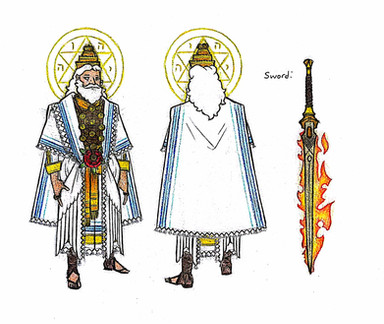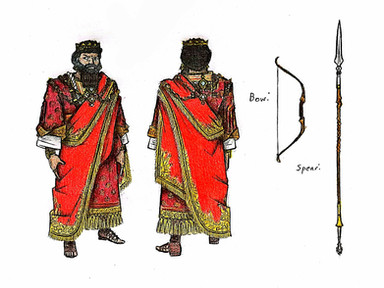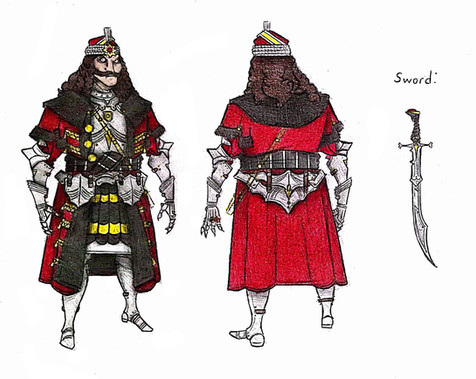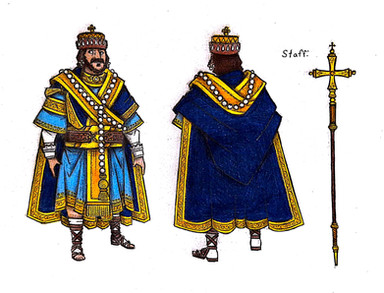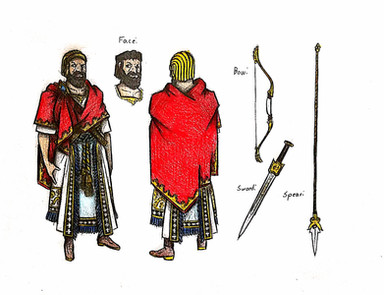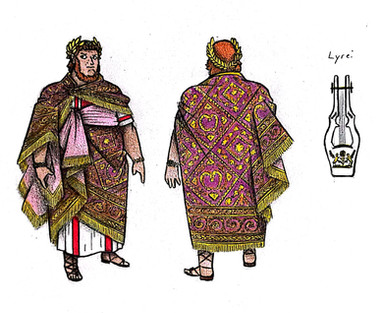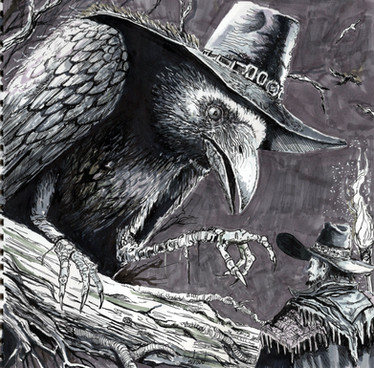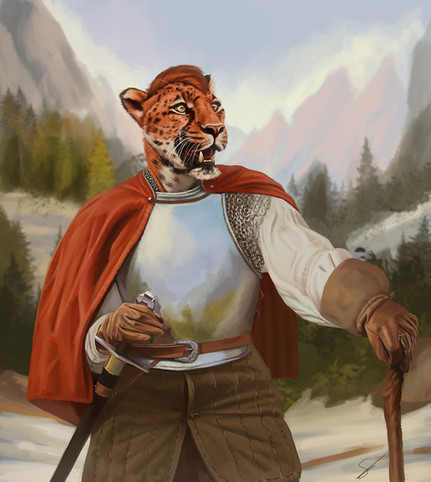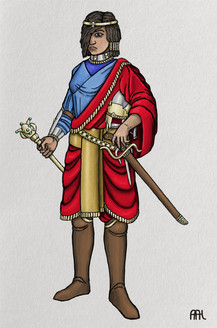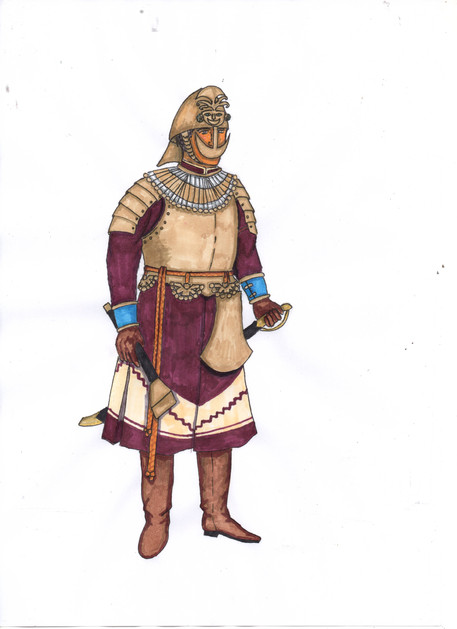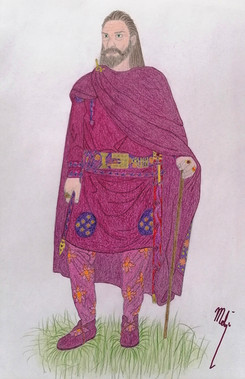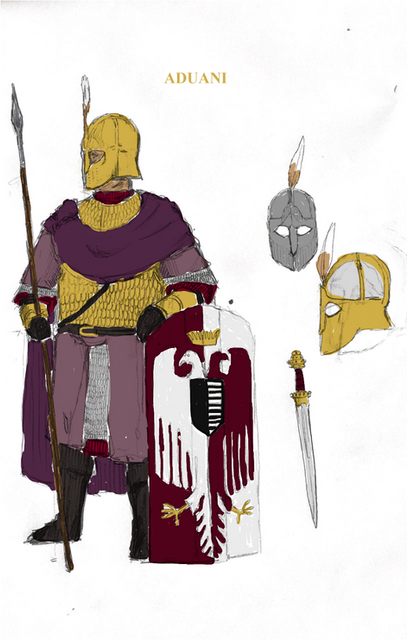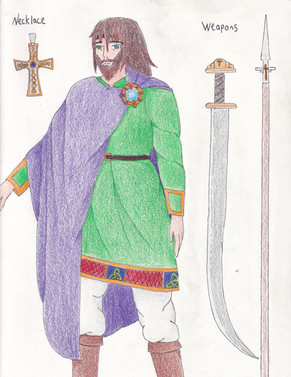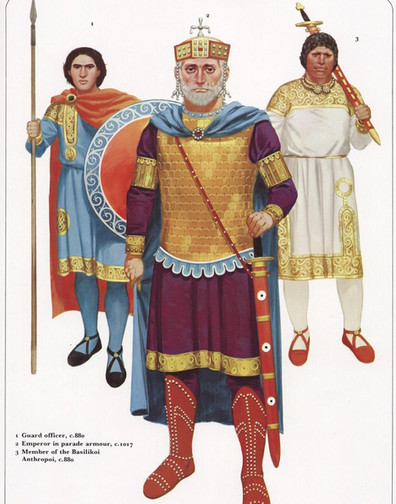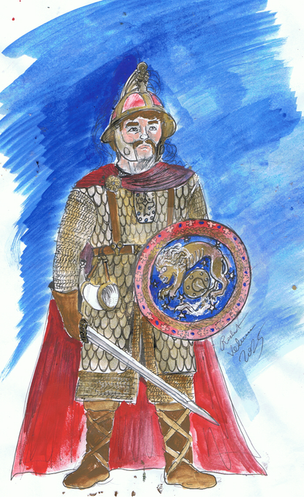HOME | DD
 Avapithecus — Justinian
Avapithecus — Justinian

#byzantine #character #design #emperor #history #justinian #referencesheet #roman #rome
Published: 2023-07-21 16:32:33 +0000 UTC; Views: 7621; Favourites: 78; Downloads: 0
Redirect to original
Description
I'm sure we all have an image that comes to mind when we hear the term "Roman Emperor". There's an assortment of larger-than-life characters that have sat on the throne of the Eternal City. Maybe you envision the ambitious god-prince Augustus, or the stoic demeanor of Marcus Aurelius, or the divine inspiration of Constantine. To me, though, there is only one man who comes to mind when I think of the penultimate Roman Emperor. If anyone was still unconvinced that Byzantium was the true heir to Rome, allow me to introduce you to Justinian. I am such a fan girl for this man. I am so desperate for a Netflix series on Justinian's life. His biography has intrigue, conspiracy, enormous ambition, and an assortment of wacky characters which need to be more prevalent in the public imagination. Even our primary source on Justinian's life, court historian Procopius, is a fascinating case study. He is most famous for his History of the Wars, in which he describes in refreshingly clear and concise language the events he witnessed first hand as an escort of Justinian's top general, Belisarius. However, in 1623, I'm not making this up, a manuscript was rediscovered in the depths of the Vatican Library. This was Procopius's Secret History, the polar opposite of the glowing review of Justinian he previously gave. It reads like a UFO nut job who desperately needs some Xanax scribbling down all the dirty corruption hidden behind government walls. He even goes so far as to claim Justinian was a demon, like literally a creature from Hell who could detach his head. His source for this is, of course, a friend of a friend of a friend who saw it happen. Hmm. I've seen differing opinions on whether or not the Secret History was actually written by Procopius or just a disgruntled nobleman using his name, but it just goes to show how dynamic and awesome Justinian's story is.Okay, let's start at the beginning then. Justinian was born Petrus Sabbatius in 483, in Dardania, a province in the Balkans north of Macedonia. He took the name Justinian to honor his uncle, Justin, a peasant pig farmer who rose through the ranks of the Roman military. By the time Emperor Anastasius died in 518, Justin had earned enough influence and wealth to buy his election to the purple. By all accounts, Justinian was the real mastermind behind Justin's reign, so it's no surprise that this incredibly talented and intelligent young man was selected as Justin's successor in 527. Now Emperor of the Romans, Justinian inherited the deteriorating relationship with their rival to the east, Sassanid Iran. While the war was drawn out and brutal, Justinian sent in his main man: one of history's coolest badasses, Belisarius. Belisarius was not a general who won every battle, but he was always renowned for his level-headedness and loyalty to his country and his men. In 530, Belisarius scored a major victory against the Persians at the Battle of Dara, which would eventually lead to the treaty of the "Eternal Peace" in 532. Belisarius returned to Constantinople just in time to deal with the first major threat to Justinian's reign. Which means we now have to talk about… sports. Oh no.
See, Rome's original favorite pastime, gladiator tournaments, had been banned since 404 because they were apparently a "violent bloodsport" that "fed people to lions". Damn snowflakes. So instead they switched to a sport more suited to a civilized sort, which we Hoosiers still boast as our specialty: racing. The chariot races had two main factions which competed against one another, the Blues and the Greens, but these were no ordinary sports teams. These races were highly caught up in politics, the center of all sorts of bribery and mob rule. If they wanted to, everyone in the Hippodrome could rise up in a rage only achievable through the adrenaline of a packed stadium and overthrow the government. And well… they tried. In 532, both factions united to plead for the lives of two criminals who hadn't died at the gallows. If there's anything more terrifying than a mob of soccer hooligans, it's a mob of soccer hooligans who have united with their rival team. Justinian himself was a Blue, for the record, but he still understood the importance of playing the teams off one another. Once he lost control of that power balance, he wanted to flee the city. His wife, however, had other plans. Empress Theodora was an inspiringly powerful woman who got her start as an actress, and she was not about to let her husband show weakness by leaving his city. Justinian loved and trusted his wife to his deepest core, so he followed her advice and got Belisarius to investigate the real source of the riots: disgruntled nobles who wanted to install puppets from the lineage of Anastasius. Belisarius did what he did best: strategize his way out of a situation. He turned the teams back against one another, uncovered the conspirators, and restored order to the capital. Justinian's reign was secure.
This freed up the Emperor's time to start working on his legacy. To replace one of the churches that had been destroyed in the riots, he began construction on one of the single most beautiful works of architecture on this planet: the Hagia Sophia. This enormous, gleaming gem has been the grand prize for every power in the region for millennia. It is such a stunning building that when Mehmed the Conqueror breached the city in 1453, he is said to have been so taken aback by its beauty that he denied his men the right to loot it lest they be punished severely. It still stands in Istanbul to this day, long since converted into a mosque, and is at the very top of my travel bucket list. I well and truly do not want to leave this Earth without some day getting to see this 1500 year old marvel which, in my mind, may as well be the center of the world given the sheer amount of history it symbolizes. Of course, Justinian wasn't just an architect, he was also a skilled statesman. In order to better organize the 1000 years of Roman law, which by that point was oversaturated, contradictory, and… well… byzantine, Justinian started fresh with the Corpus Juris Civilis. This is a concise legal code which became the bedrock of European schools of law even up to the modern day. It is a legacy which cannot be understated.
But something was still… off, something that nagged at Justinian for years. He was the Roman Emperor, so why the hell was the Eternal City itself not within his borders? This simply would not do. There were still men alive who were there to witness the so-called "Fall of Rome" in 476, and Justinian had a dream to wipe away this misconception. When the Vandalic king Hilderic was deposed by anti-Roman noblemen, Justinian seized the chance to declare war. Once he secured peace with Iran in 532, he sent General Badass, aka Belisarius, into North Africa to "secure" the Vandal territories. Within a year, Carthage belonged to Rome once again, and for his stunning performance on the battlefield, Justinian would award Belisarius a Triumph. This would be the last such honor a Roman General would ever receive. With the way clear, Belisarius marched north up the boot of Italy to reclaim the grand prize, Rome, from the half-elf Vitiges, king of the Ostrogoths. By 536, he did it, the mad bastard did it. Rome was, for the first time in 60 years, Roman. And man, the story really should've ended there…
But sadly, this is history, and all things must walk forward into the inescapable palm of entropy. See, taking Rome wasn't easy. Not because of Ostrogoth competence or anything, that was quite lacking. Belisarius's biggest obstacle was the insubordination and incompetence of his own commanding officers, John and Narses. Their stumbles made keeping Italy more of a hassle than it should've been, and it gave the half-elf king a chance to flee to the Sassanid king, Khosrow, begging on his knees for help. The Sassanids, always eager for an excuse to troll the Byzantines, gladly accepted, making the so-called "Eternal" Peace last a whopping nine years. No yeah that sounds about right. The Persians invaded the province of Lazica to force the Byzantines to focus on their eastern border. Belisarius was absolutely pissed to find out he was being dragged away to go squabble with the Persians over some podunk little province in the Caucasus. He was so pissed, in fact, that he crossed his arms and refused the reassignment, claiming that he believed his most trusted friend Justinian would never wave away their dream like that. The insubordination rubbed Justinian the wrong way, and one of his advisors, a tax collector named John the Cappadocian, saw this as the perfect way to get rid of his rival Belisarius. Theodora, brighter than all the stars in the sky, knew better than to trust a tax man, though. To route out his schemes, she arranged a secret meeting in which she pretended she was orchestrating a plot to overthrow her husband, and when John was like "hell yeah let's do it, screw that guy!" she had him tried and exiled for conspiracy. God I love this bitch. Still, the specter of betrayal would continue to haunt Justinian, at least until that darkness was overshadowed by something much, much more demonic.
In 536, the Sun turned black. And I don't mean like as in an eclipse, though coincidentally that did happen as well. Unprecedented volcanic activity in the Americas and/or Iceland plunged the world into a volcanic winter which choked the sky and strangled the day. This led to widespread crop failure across Europe, which in turn led to great famine and conflict. This was among the more manageable problems, though. In 542, a man in Pelusium got sick. He was a nobody, a farmer whose most eventful episode of the week was chasing those damned flea-bitten rats out of his granary. He felt fine for a few days after that, then his body seemed to give up on him, his internal temperature fluctuating between infernal fever and crippling chills. It only got worse. The lymph nodes in his neck, armpits, thighs, and groin swelled up to the size of apples, filling up with a most repulsive black puss that stank of necrosis. Though his family doted on him for the next three days, he deteriorated into agony and madness as his body rotted while he still lived. Then the pustules burst, spraying the sludge all over those at his bedside, and he died. The cycle repeated for all who were at his deathbed, then for everyone next door, then everyone on the street, in the city, in all of Egypt, and soon all across the Mediterranean as far away as Ireland before a year had even passed. Before them was a pale horse. Its rider's name was Death, and Hell was following close behind him.
You see, that man in Pelusium was infected with the bacterium Yersinia pestis, the same wretched pestilence which later generations of men would name the Black Death. This was the first recorded outbreak of the Plague in human history, and as is true of all diseases, it does not see borders nor class nor wealth nor race nor creed. It sees hosts. 1 in 4 people from Ulster to Alexandria to Constantinople were hosts. Justinian became one of those hosts. When the Emperor's skin began to rot, and consciousness failed him, it sent the entire Roman Empire into a panic. Many wondered if Belisarius would take the chance to seize the throne for himself, but Belisarius was a noble Roman and Justinian was his best friend. He did everything in his power to quell these rumors, while Theodora doted on her beloved husband, taking control over the empire and keeping the jackals at bay until the miracle happened: Justinian woke up. He returned to deal with the Persians, who also had to retreat to deal with the Plague, but the war would drag on until 562. The war in Rome became a grind, unsustainable. Belisarius's replacement, Bessas, lost the city in 546, and it was the first strike in a very drawn out match of Pong. As if to sap the last of Justinian's fire, Theodora died in 548. Justinian was inconsolable, weeping at her casket. Though he had no heir, he refused to remarry and sully his love and loyalty to her. He'd rather the Plague had taken him than that. Instead, he named his nephew, Justin, as his successor, and thus in that strange sort of way, our story comes full circle as Justinian died in 565. He left behind the enormous shoes of not just a great king, but a true Roman Emperor, and now that all that serious shit is out of the way, I'm gonna scream into the void demanding my Netflix series again.
Design notes, the majority of this piece is taken from the famous mosaic in the Basilica of San Vitale which depicts Justinian surrounded by his advisors. It's a bit simplistic for my tastes, though, so I added a few bits of flare from an old print of who seems to be Justinian which the internet unhelpfully labels as just "antique", as well as the jewelry he wears in a 1912 illustration by Herbert Cole, from which I also took the sword. His armor is primarily a combination of the suit depicted on the Barberini Ivory and a rendition done by Russian artist Andrei Evgenevich Negin. Yes I know the cape is wonky, yes it's pissing me off too. Unfortunately it's been averaging 90 degrees here in Indy plus thunderstorm humidity so I can't always keep my paper from warping. I fix it as best I can when I go to scan and this is what I got. Thankfully the way I crop my D&D tokens cuts that chunk out of sight so at least I won't have to think about it too much.
Related content
Comments: 7

👍: 1 ⏩: 1

👍: 0 ⏩: 0

👍: 1 ⏩: 1

👍: 1 ⏩: 1

👍: 1 ⏩: 0

👍: 3 ⏩: 1

👍: 1 ⏩: 0
